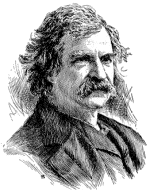The Boys’ Life of Mark Twain
by Paine

LXVIII. Days in Bermuda
Ten days later Mark Twain returned to Bermuda, accompanied only by a valet. He had asked me if we would be willing to close our home for the winter and come to Stormfield, so that the place might be ready any time for his return. We came, of course, for there was no thought other than for his comfort. He did not go to a hotel in Bermuda, but to the home of Vice-Consul Allen, where he had visited before. The Allens were devoted to him and gave him such care as no hotel could offer.
Bermuda agreed with Mark Twain, and for a time there he gained in strength and spirits and recovered much of his old manner. He wrote me almost daily, generally with good reports of his health and doings, and with playful counsel and suggestions. Then, by and by, he did not write with his own hand, but through his newly appointed “secretary,” Mr. Allen’s young daughter, Helen, of whom he was very fond. The letters, however, were still gay. Once he said:
“While the matter is in my mind I will remark that if you ever send
me another letter which is not paged at the top I will write you
with my own hand, so that I may use in utter freedom and without
embarrassment the kind of words which alone can describe such a
criminal.”
He had made no mention so far of the pains in his breast, but near the end of March he wrote that he was coming home, if the breast pains did not “mend their ways pretty considerable. I do not want to die here,” he said. “I am growing more and more particular about the place.” A week later brought another alarming letter, also one from Mr. Allen, who frankly stated that matters had become very serious indeed. I went to New York and sailed the next morning, cabling the Gabrilowitsches to come without delay.
I sent no word to Bermuda that I was coming, and when I arrived he was not expecting me.
“Why,” he said, holding out his hand, “you did not tell us you were coming?”
“No,” I said, “it is rather sudden. I didn’t quite like the sound of your last letters.”
“But those were not serious. You shouldn’t have come on my account.”
I said then that I had come on my own account, that I had felt the need of recreation, and had decided to run down and come home with him.
“That’s–very–good,” he said, in his slow, gentle fashion. “Wow I’m glad to see you.”
His breakfast came in and he ate with appetite. I had thought him thin and pale, at first sight, but his color had come back now, and his eyes were bright. He told me of the fierce attacks of the pain, and how he had been given hypodermic injections which he amusingly termed “hypnotic injunctions” and “the sub-cutaneous.” From Mr. and Mrs. Allen I learned how slender had been his chances, and how uncertain were the days ahead. Mr. Allen had already engaged passage home for April 12th.
He seemed so little like a man whose days were numbered. On the afternoon of my arrival we drove out, as we had done on our former visit, and he discussed some of the old subjects in quite the old way. I had sold for him, for six thousand dollars, the farm where Jean had kept her animals, and he wished to use the money in erecting for her some sort of memorial. He agreed that a building to hold the library which he had already donated to the town of Redding would be appropriate and useful. He asked me to write at once to his lawyer and have the matter arranged.
We did not drive out again. The pains held off for several days, and he was gay and went out on the lawn, but most of the time he sat propped up in bed, reading and smoking. When I looked at him there, so full of vigor and the joy of life, I could not persuade myself that he would not outlive us all.
He had written very little in Bermuda–his last work being a chapter of amusing “Advice"–for me, as he confessed–what I was to do upon reaching the gate of which St. Peter is said to keep the key. As it is the last writing he ever did, and because it is characteristic, one or two paragraphs may be admitted here:
“Upon arrival do not speak to St. Peter until spoken to. It is not
your place to begin.
“Do not begin any remark with “Say.”
“When applying for a ticket avoid trying to make conversation. If
you must talk, let the weather alone. . .
“You can ask him for his autograph–there is no harm in that–but be
careful and don’t remark that it is one of the penalties of
greatness. He has heard that before.”
There were several pages of this counsel.
 Continue...
Continue...![[Buy at Amazon]](http://images.amazon.com/images/P/B0006AHKG6.01.MZZZZZZZ.jpg)